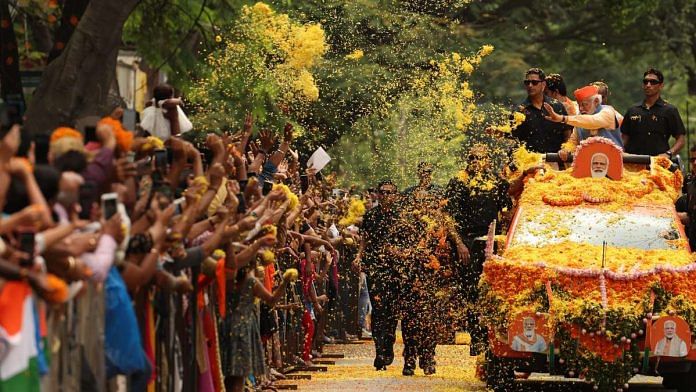In the aftermath of the recently concluded Karnataka assembly election, many critics advanced intellectually dubious arguments in the eagerness to interpret the setback to the Bharatiya Janata Party. Two such arguments stand out for their insidious suggestions.
The first was made by Sanjaya Baru, former media advisor to Manmohan Singh. Writing for Deccan Chronicle, he made the sweeping insinuation that the 36 per cent of voters in Karnataka who stood by the BJP are “communalised sections of the middle class”. The second and far more insidious argument was advanced by historian Ramachandra Guha. In conversation with journalist Karan Thapar, Guha sought to advance the narrative of a “BJP-free South India” while dismissing that the party’s vote share remained more or less intact.
While the BJP fell victim to the vagaries of the simple-majority system and allegations of corruption, its vote share across the state and its strong performance in and around Bengaluru underscore that neither of the arguments has a sound factual basis.
Also read: PM Modi must worry. Karnataka is the latest sign of a deepening crisis ahead…
Don’t broad-brush the South
Both Guha and Baru’s arguments fit into the broader narrative of South Indian exceptionalism in national politics that has been advanced for some time now by certain leaders and parties from Tamil Nadu and Kerala. The reality, however, is that the calculus of electoral politics across South Indian states is markedly different. Extrapolating the outcome in Karnataka to future electoral battles in Telangana and Andhra Pradesh is a fool’s errand, given the demographics of these two states and the issues that define their electoral battlegrounds. Painting the politics of all the states in the region with a broad brush of South Indian exceptionalism is a lame attempt. The larger idea is to impose the barely relevant Dravidian template of Tamil Nadu onto neighbouring Telugu-speaking states of Andhra Pradesh and Telangana. By uncritically upholding this template as an exemplary system of governance, political commentators are unwittingly committing the same mistakes as those who stereotype all South Indians as ‘Madraasi’.
If anything, in the past two decades, there have been immense socio-economic shifts across the South Indian states that have broken stereotypes and defied popular misconceptions. The recent brouhaha over migrant workers in Tamil Nadu is a case in point. It underscores the perils of political parochialism, given the economic importance of migrant labourers from Bihar, Uttar Pradesh, and the Northeast for the farming and manufacturing sectors. It is this phenomenon of workforce mobility that mustered support to the BJP within its voter base in Karnataka—the same group Baru mindlessly labelled as a “communalised section”.
Also read: BJP’s Karnataka defeat is a blessing in disguise. It will help Modi in 2024
Blurring borders
GST reforms boosting inter-state economic activities have deepened interdependence over the years; the resulting soft power of culture has rendered the Nehruvian-era linguistic division of states less relevant. A testimony to this fact is the increasing popularity of South Indian movies across the Hindi belt. It is not limited to Tollywood blockbusters such as Baahubali and RRR but also to several lesser-known dubbed films that routinely fill up movie slots on multiple Hindi movie channels, including DD FreeDish DTH, the largest satellite television platform in India that reaches into more than 40 million homes across the country.
While researching for my recent book Collective Spirit Concrete Action, I learnt how this diffusion of culture has harnessed linguistic diversity across India for the greater good. From NS Rajappan, a disabled resident of Kerala who took upon himself the onerous task of removing plastic waste from lakes, to Yeldi Hari Prasad, a traditional weaver from Sircilla in Telangana who gifted a handwoven cloth with the G20 logo to the PM, reflecting the spirit of Vasudhaiva Kutumbakam (the world is one family), one experiences a shared sense of purpose that transcends parochialism.
‘BJP-free South’ an artifice
Removed from the cynicism of the 24×7 political news cycle on social and mainstream media, the silent social change heralded by Prime Minister Narendra Modi’s Mann ki Baat radio programme reflects positivity and shared optimism. It has inspired millions in India, from bus conductors to toy makers. From Subrahmanya Bharathi’s poetry on Irish teacher Sister Nivedita, a disciple of Swami Vivekananda, to the Kashi Tamil Sangamam in 2022, one gets a sense of how artificial and contrived the divisive rhetoric of South Indian exceptionalism really is.
The BJP’s political fate in South India will ultimately be dictated by its ability to connect with voters on issues paramount to them in each of these states. The fact that scores of Indians — from Tamil Nadu to Telangana — have identified with PM Modi through Mann ki Baat and become agents of change at the grassroots, championing sustainable development is a good start. And that is a fitting repudiation of the toxic and divisive political narratives advanced by critics like Guha and Baru in their eagerness to write off the BJP down south.
Shashi Shekhar Vempati is former CEO of Prasar Bharati, India’s Public Service Broadcaster. He tweets @shashidigital. Views are personal.
(Edited by Humra Laeeq)



